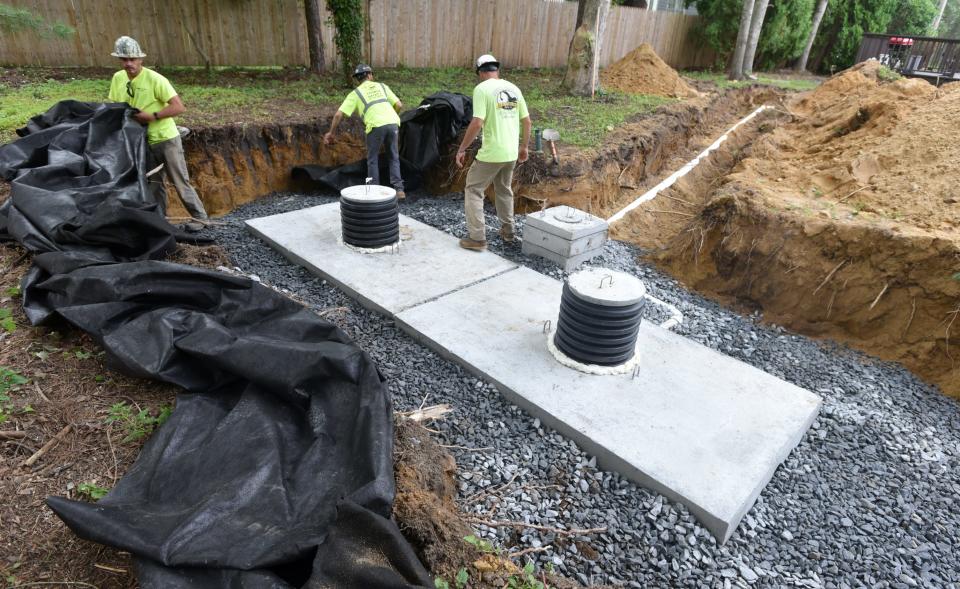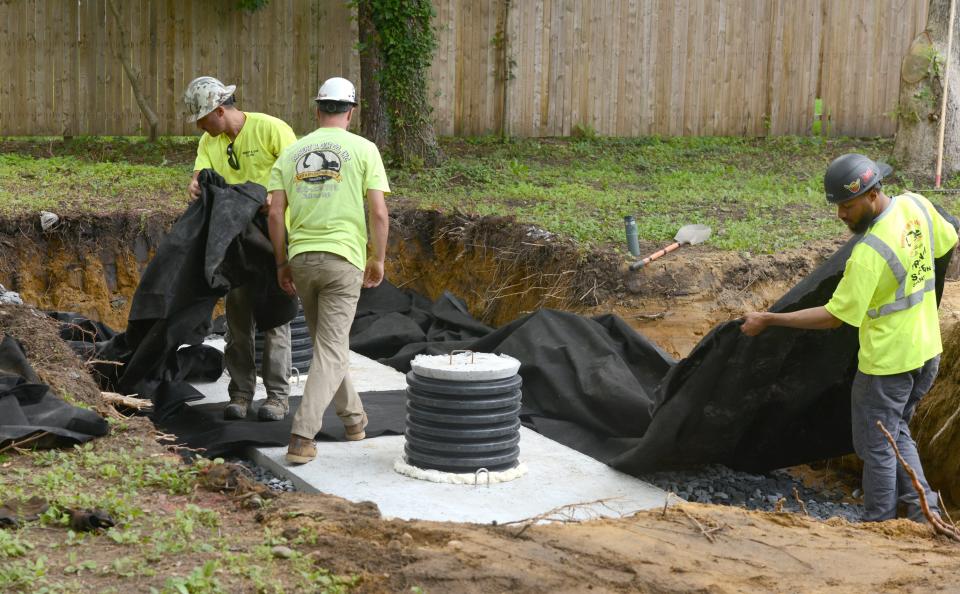Lawmakers eye tax credit for septic system work. How does the Cape benefit?
- Oops!Something went wrong.Please try again later.
As the state ramps up pressure to reduce nitrogen pollution in the region's estuaries and embayments, Cape Cod homeowners, who face expensive septic system replacements or upgrades, could have some good news.
Extra money in their state tax returns.
The Senate is proposing to increase the state tax credit for septic system replacements and upgrades, and cesspool replacements, allowing property owners to tap into $18,000 in credits over five years, said Sen. Julian Cyr, D-Truro.
The measure coincides with the Massachusetts Department of Environmental Protection's adoption of enhanced environmental rules under the state's Title 5 law governing septic systems, which become effective today.

Aimed specifically at Cape Cod, the new regulations call for enhanced nitrogen removal in watersheds now designated as nitrogen sensitive areas — primarily on the Nantucket Sound side, but also including the bay-facing watershed feeding into Wellfleet Harbor.
The goal is to reduce nitrogen that's hurting the peninsula's coastal waters, mostly coming from standard household septic systems and cesspools that don't filter out the nutrient. Excessive nitrogen degrades water quality, harming the marine ecosystem, uglying the water for recreation and ultimately hurting the region's economy.
'We tripled the tax credit'
The augmented tax credit is part of the Senate's nearly $590 million tax reform bill, which the upper chamber unanimously approved on June 15, Cyr said. The bill is presently in conference committee, where lawmakers are working on reconciling the Senate's plan with the plan approved by the House of Representatives.
Under current state provisions, homeowners may seek up to $6,000 in credits for septic system and cesspool work, receiving up to $1,500 back annually over four years. Cyr noted that the Senate's extra tax credit for this purpose exceeds a proposal by the Healey-Driscoll Administration that suggests doubling the credit.

"The governor was doubling the credit to $12,000," he said. "We tripled the tax credit to $18,000."
Under both the governor's plan and the Senate's plan, homeowners could receive back up to $4,000 annually until the cap is met. Replacing or upgrading systems to filter out most nitrogen can cost around $35,000.
"A very substantive policy' that will benefit the Cape & Islands
Even though many towns are planning sewer systems, a larger tax credit is particularly important to thousands of Cape Cod residents who may still face significant expenses to upgrade or replace their septic systems in the next seven to 20 years, depending on their town's plans for addressing the problem.
The state DEP and the Cape Cod Commission have both indicated that most of the 14 Cape towns affected by the new regulations — Provincetown, with no nitrogen sensitive areas, is the one exception — are expected to apply for watershed permits that outline plans for reducing nitrogen pollution.
This option gives towns up to 20 years to reduce nitrogen through any combination of standard wastewater management technologies, such as sewers and upgraded septic systems, and non-traditional approaches, like shellfish aquaculture, permeable reactive barriers, salt marsh restoration, and stormwater retrofits.
Towns have two years to apply for, or indicate plans to apply for, a watershed permit. Meanwhile, homeowners in any communities that choose not to go that route within the next two years will then have five years to replace or upgrade septic systems, or to replace cesspools.
Tax credit would be 'a huge boost' to homeowners
"For local homeowners who are going to have to upgrade septic systems or replace systems, this is going to provide a huge boost," Cyr said. "It's a very substantive policy that the Cape and Islands will benefit from quite a bit."
The Legislature budgets for any anticipated tax relief when making final budget decisions. No federal money will be used in offsetting the credits.
Cyr said the tax relief package submitted by the House does not include an additional credit for septic system and cesspool work. He is optimistic about its chances.
"It is not a controversial piece of the bill," he said.
Sen. Susan Moran, D-Falmouth, on the conference committee working to mesh the House and Senate tax relief bills, is reserving comment on the Senate's proposed tax credit while deliberations are ongoing.
Another financial relief option in the toolbox

Besides the tax credit increase, the Cape Cod & Islands Water Protection Fund within the state's Clean Water Trust, is dedicated to helping Cape Cod, Martha's Vineyard and Nantucket towns pay for water infrastructure and water quality improvement work.
Cyr and state Rep. Sarah Peake, D-Provincetown, supported by the region's officials and environmental and business organizations, worked on Beacon Hill to establish the fund in 2018, funding it through a 2.75% excise tax on all rooms in hotels, motels and short-term rentals.
"This is a pot of money that is on top of, and above, the existing State Revolving Fund Loan Program," Cyr said. "We're self-funding through our visitors. It's been hugely successful, with really, really substantial, significant aid for the region."
A critical imperative
Officials, lawmakers and environmental groups agree it is critical for Cape communities to fix the nitrogen pollution problem. According to the Association to Preserve Cape Cod, the peninsula's estuaries and embayments are growing increasingly degraded. The number of water bodies rated "unacceptable" for water quality increased from 68% to 90% between 2019 and 2022, according to the organization's 2022 State of the Waters report.
On Cape Cod, the problem is especially pronounced because its sandy soil quickly absorbs nutrients, like nitrogen and phosphorus, from wastewater released by septic systems, allowing them to enter nearby waters more easily.
The vast majority of properties on the Cape use on-site septic systems. Among the 126,000 parcels on the Cape with on-site septic systems, only a fraction — 1,937 parcels — are innovative or alternative septic systems that filter out nitrogen. Just more than 7,000 parcels are connected to public or private sewer systems.
Heather McCarron writes about climate change, environment, energy, science and the natural world. Reach her at hmccarron@capecodonline.com, or follow her on Twitter @HMcCarron_CCT
Keep connected with the Cape. Download our free app.
This article originally appeared on Cape Cod Times: Senate looks to help Cape Cod homeowners pay for septic systems

